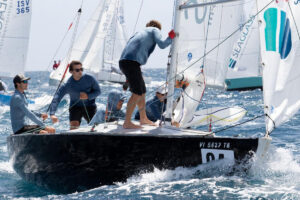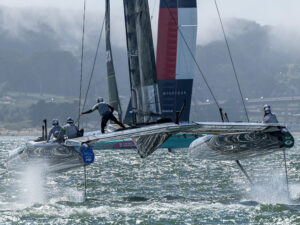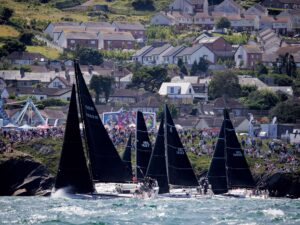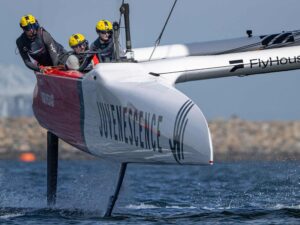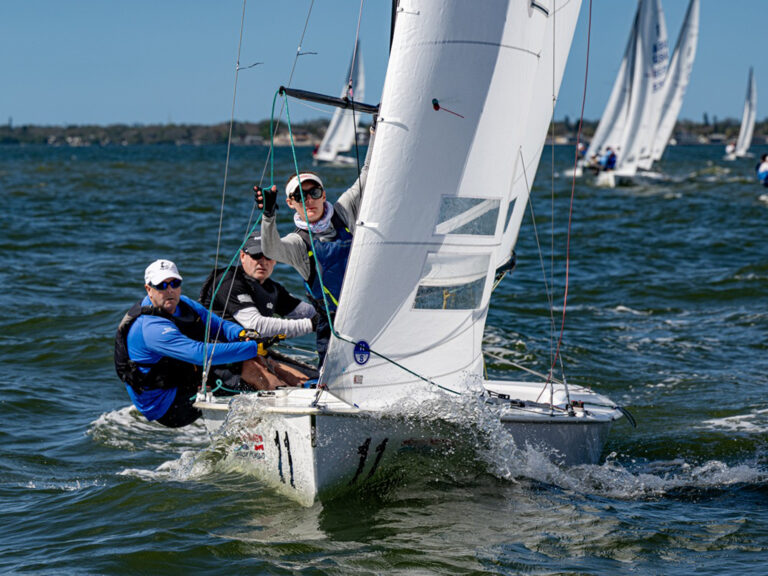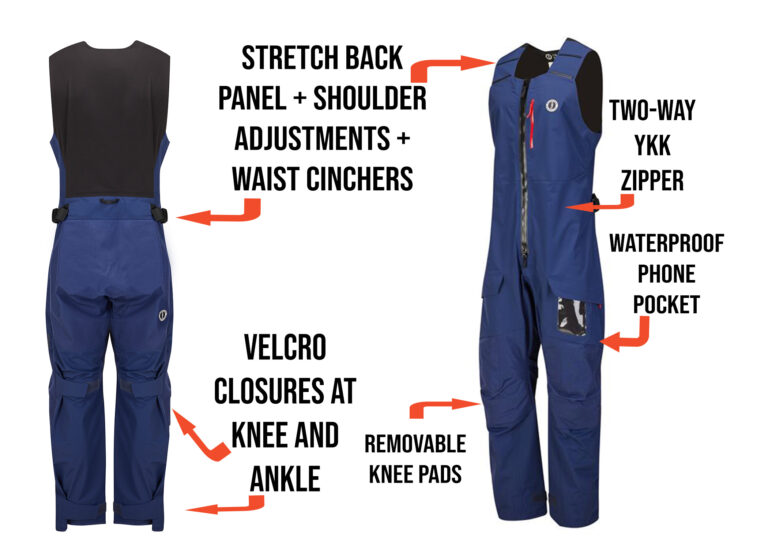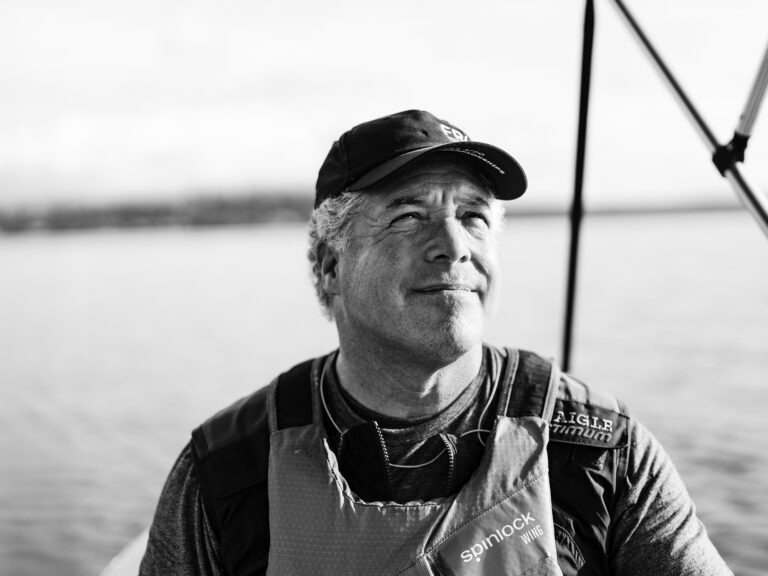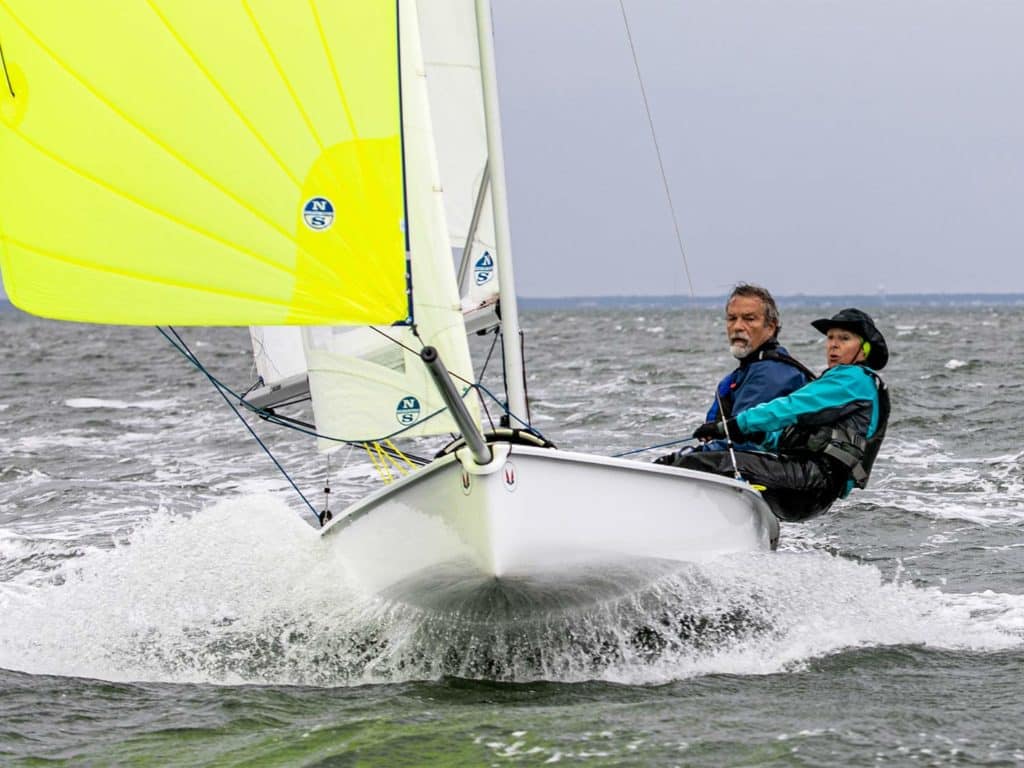
My wife, Sarah, is my secret weapon for a lot of things, especially when it comes to mark roundings on Barnegat Bay, where she learned to sail. About 60 years later, she and I are racing our brand new Melges 15, and we’re in the hunt. We’re nearing the top mark somewhere between Marjorie’s Bar and Barrel Island, where locals know tide will be a factor.
“You’re going to want to overstand,” she says in a tone that means business.
The port tackers coming into the mark from the left are facing an adverse 2-knot current, and there’s a notable cluster developing where we don’t want to be. Summoning her years of local knowledge—learned in the pressure cooker of the Sneakbox fleet and passed down like the tablets from her illustrious forebears sailing E Scows—we hold high on the starboard layline (into the next ZIP code as far as I’m concerned), and pass elegantly around the hot, screaming mess to leeward.
This is when the fun really starts. In three tugs, she launches the asymmetric spinnaker out of the bow sock. We harden up and immediately rocket onto a plane. We manage the first jibe with a modicum of grace. But we’re quickly passed by Emily Haig and crew, father John, whose butt appears flush with the freeboard. (Note to self: As with proper grammar and holding the door for one’s lady, you cannot escape certain rules…including the need to hike.)
For the remainder of the day, Sarah is gracious enough to hold her tongue at the sloppy tacks, the cringe-inducing tactics and, well, let’s not mention the starts. But after every race in that July barnburner, we are relearning tacking, jibing, balance and tide sweep. We’re sailing fast and we’re laughing it up.
We are back in the game.
And that was precisely the point back in the plague-ridden winter of 2020 when we took a call from our friend Chris Fretz, a fellow traveler from Little Egg Harbor YC. He wanted us to pony up the money we weren’t spending on restaurants and buy into the sight-unseen idea of the Melges 15. Sarah and I had grown up sailing E Scows with our dads. In a more recent epoch, we crewed together on Doug Galloway’s LE-4 and rekindled our enthusiasm for the beloved boat of our upbringing.
I also discovered how much I loved sailing with Sarah—me on the jib, Sarah on the spinnaker, Rich Neff on the boards and uphauls, Doug tasked with getting us around the course unscathed. Excellent times. But then our friend Doug passed away from cancer—and the E Scow was just too much of a strain.
Enter the Melges 15.
“Little did I realize, Sarah got the same email with the same YouTube link. She was in the next room putting together her pitch. We met in the kitchen and placed the order. Right then. Right there.”
Timothy Cole
Through the miracles of YouTube, I got a sense for the boat’s capabilities, fell madly in love with the kite, and sold my wife on the concept in about five seconds. Little did I realize, Sarah got the same email with the same YouTube link. She was in the next room putting together her pitch. We met in the kitchen and placed the order. Right then. Right there.
It came down to this: After the thrills of a performance experience like the E Scow, we were loath to retreat to a “retirement” boat with bench seating like the Lightning, the Flying Scot, or any of the well-regarded family of Marshall cats (insert apology to all loyal devotees here). We wanted our fannies to once again make contact with the gunwale. And like a lot of scow sailors (who’ve also had experience sailing iceboats), we are crazy for off-wind speed. Now Sarah and I are out there sharing the same adrenalin. In a big blow, with the kite up and the boat half out of the water, we are young again.
Bonus: We switch up the duties and both steer every other race, which gives the crewing party a chance to offer (mostly) sage, nurturing advice.
Builder Harry Melges III says that the design brief for the Melges 15 was challenging in its simplicity. It had to appeal to kids of all ages, like us.
“The classes with the best ability to incorporate the entire family are the ones that have generational success,” Melges says. “We really focused on making sure the M15 was fun, stable, durable, a great performer, comfortable for all ages to sail, and priced to be a great value.”
Apparently, we aren’t the only ones who’ve decided the Reichel/Pugh-designed M15 might be the “it” boat of our age. From a standing start this past spring, the class hosted its first three-regatta winter series in Sarasota, Florida, in January. The top-five finishers in the first regatta saw a mix of youth, experience and family togetherness. JJ Smith and Will Murray, of Palmetto, Florida—who were also top woman and top youth, respectively—won the first regatta, beating Finn Burdick and Melges president Andy Burdick, of Lake Geneva, Wisconsin, with son skippering and dad crewing. There were Top Masters, Top Grandmasters, and what the heck, Top Mega Masters Ted Weihe and Joe Grabowski, of Sarasota.
What brought this 25-boat regatta together for the first winter series in a class that’s not even a year old? It might be something a little deeper than the “something for everyone” fallback. Someone, probably a Phoenician, said that a boat is a compromise. Strengths are offset by weaknesses. A gain here means giving up something over there. If there’s a compromise anywhere on this boat, we can’t find it. If anything, it’s built on this central premise: Make it fast and make it easy.
I see the Melges 15′s DNA in Reichel/Pugh’s big-boat offshore progenitors, like the record-smashing Wild Oats XI. A chop-cleaving plumb stem and narrower sections forward flare out to a maximum beam carried well aft. Flat sections from the midpoint translate farther aft to a wide transom that invites ready planing.
You see this design lineage in the Reichel/Pugh-designed Melges 24 and Melges 14. At every place the Melges 15 touches the water, the boat makes maximum use of the opportunity. That chop-busting prow upwind transitions to a scowlike surf machine off the wind. With the kite up, the bow lifts out of the water all the way back to the chainplates. Even when we’re sliding down the front of a wave, the boat feels nicely balanced, with controls that fall effortlessly to hand, an easily driven sail plan, and spin-on-a-dime maneuverability. Sailing fast is stable, safe and fun.
So much for how the boat connects with the water; how does the crew connect with the boat? When I step aboard, I see that the rectangular cockpit is deep, and my knees offer thanks. The wraparound side tanks supply plenty of buoyancy either underway or just fiddling at the dock hoisting the sails. The pintles snap smartly into the gudgeons for the beefy alloy rudder. Likewise, the alloy daggerboard slots through a pair of trunk-protecting ABS plastic receivers.
The main and jib sheets lead into the crew positions amidships, and control main, jib and spinnaker. There are enough tweakable items such as the jib sheet leads and traveler to satisfy the confirmed tinkerer. The breakthrough vang design offers leech tension with a strut extending from above the gooseneck down to the boom, which makes traversing the cockpit a pleasure.
Our tour concludes at the bow, where the asymmetric kite emerges from a rugged bow sock affixed to the flat, elevated platform forward of the mast. The retractable sprit emerges, lancelike, when you pull the halyard, which is on a continuous circuit that leads out through the sock, through three grommets in the sail, culminating at the top. To strike, pop the halyard and pull on the douse line, which collapses the sail back into the sock and automatically retracts the bungee-enabled sprit.
So just what do we have here? It’s a quick-to-plane 15-foot doublehander weighing in at 230 pounds built around an easy-to-handle sail plan and a laugh-out-loud asym. Crew weight shouldn’t exceed 400 pounds. But the numbers don’t tell the whole story. It’s a great boat for sailors with all kinds of different experience levels: emerging juniors, intercollegiate sailors, beginner and returning seniors, couples, moms, dads, and kids.
The racing is tight enough to offer close-quarters stimulation, and we’re always learning something new. The buy-in is manageable, and whole fleets are materializing out of the blue. If anything, the recent winter regatta series in Sarasota showed us that women intercollegiate sailors and other youngsters have an edge. But that’s always been the case, and returning alums (like Sarah and me) are just happy to be up there occasionally, where we can see the whites of their eyes.
When Sarah and I get off our Melges 15, the boat is the topic of conversation in the car, over dinner, and before the lights turn out at night. When we get off the boat, we want to get right back on.
Sarah calls her Dreamboat. It’s a perfect fit.

